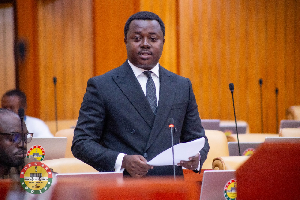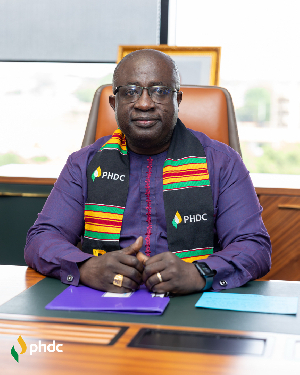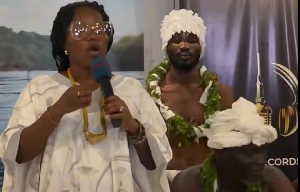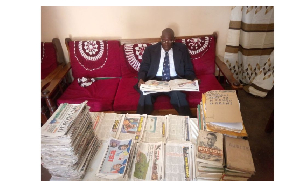Preamble:
Ghana signed the Geneva 2006 (GE-06) Agreement establishing the digital terrestrial broadcasting plan in the bands 174 – 230 MHz and 470 – 862 MHz at the Regional Radiocommunications Conference (RRC-06). Membership of the International Telecommunications Union (ITU) works to improve the efficient use of the finite frequency spectrum.
Offering broadcasting services using Digital Video Broadcasting (DVB-T) with compressed technology would make the digital dividend available to broader swathes of the country, in addition to the spectrum being utilized to deepen the availability of broadband services for Ghanaians. In 2015, the Government was able to auction one spectrum bloc in the 800Mhz band to MTN which is being used to offer 4G services. This is the object of migrating from analogue to digital terrestrial television platforms.
The China Export/Import (EXIM) funding facility is inter-governmental. The Government of Ghana when advised on the availability of such financing in 2012, applied to the Chinese Government to access the funding. One of the conditions of the funding arrangement is that the facility would be granted through a Chinese company that has gone through the appropriate procurement processes to win the bid. It is our understanding that the funds were not secured because of delays on the part of the Government of Ghana. There are requirements in any funding arrangement and such requirements must be respected to be able to access funding. The framework agreement for the loan was signed by the then Minister of Finance. The then administration also terminated it because of the convenience clause.
A settlement agreement has been signed and is being implemented by the Minister for Justice and Attorney General, for the withdrawal of the arbitral case at the International Chamber of Commerce (ICC).
Q&A
1. What realistically are the stakes in the confusing tension?
What is at stake can be classed in the following way:
a. Competition for market/subscriber share among both FTA and Pay-TV service providers.
b. Concern among some TV providers that others are being given an undue advantage by Government.
c. Ensuring a fair playing ground in the TV broadcasting sector
d. Lack of adequate and accurate information
2. Has the MoC been fair to its Ghanaian stakeholders in the matter?
We believe that for the following reasons, one can conclude that the MoC has been fair to all stakeholders.
a. There has been constant engagement with stakeholders since 2009 when a digital broadcasting migration committee was constituted with membership from various institutions in the broadcast industry.
b. It is our understanding that the MoC, engaged stakeholders including GIBA, GBC, NCA, Ghana Institute of Engineers, Ministry of Information, Creative Arts Industry on the Digital Switch Over (DSO) processes and solicited their input for the successful implementation of the program.
c. The MoC has worked with all stakeholders and solicited input to develop a final draft of the ~DTT policy.
d. The Government financed and built a digital terrestrial television platform that all analog licensed FTA broadcasters are being migrated to. This platform will provide nation-wide services for broadcasters. This DTT platform is being implemented by KNET Ltd, a Ghanaian company that has constructed 42 transmission sites and a Headend. KNET is also providing Operation and Maintenance (O&M) services till March 2020.
e. It is supporting the provision of equipment to enable deprived rural communities have access to digital TV through the 300 Village Satellite TV project.
f. MoC has also worked with VRA, NEDCO, ECG and KNET to ensure that all 42 sites now have dedicated power transformers to deliver good quality power required for the equipment in the sites to ensure
g. Looking to the future to ensure the platform can support new entrants into the TV media space is further evidence of the MoC’s even-handedness.
h. It is our understanding that the MoC is developing policies that will ensure growth in the tv media sector, boosting the digital economy, creating jobs and investment in the local content industry.
3. How will the government-led distribution of StarTimes set-top-boxes (STBs) and other systems affect digital migration in Ghana?
It is our understanding that the distribution of StarTimes setup boxes are not led by the Govt. Through the instrumentality of the MoC, the government consulted MPs and MMDCEs in the selection of the 300 villages in all regions of the country to help ensure equity. The team help selects the public areas and the 20 households to benefit from the installation of the satellite TVs. This does not affect or as anything to do with the digital migration in Ghana.
4. Should the government consider tax waivers on the importation of satellite equipment and other broadcast materials for all National Communications Authority (NCA) authorized satellite TV operators?
Tax waivers are often abused, and a case should be made for each request for a waiver. Government can and does consider applications for tax waivers on a case by case basis, and ought to be disposed to waivers for Corporate Social Responsibility projects that can be demonstrated to benefit the less fortunate members of society.
In respect of the 300 villages satellite TV project, a grant was given by the Chinese Government to Ghana in the form of solar-powered projection TV systems, digital TV systems and STBs. This equipment arrived consigned to the Government of Ghana. As part of the agreement for the grant for the project, the responsibility of Government to clear the goods for implementation were clearly spelt out.
The tax exemptions were to the best of our knowledge requested, obtained lawfully, with all lawful processes followed.
The Contract signed between Government of Ghana and KNET Ltd for the DTT platform also provided tax exemptions for KNET which have been duly executed.
5. Should government drive the distribution of commercial Pay TV set-top boxes of a private satellite TV operator against other authorized Pay TV operations, while the nation agreed to the establishment of digital terrestrial television (DTT) broadcasting?
It is true that the government in the person of the MoC does not have as part of its mandate, authority to distribute Pay-TV, STBs of any TV operator. In the case of the satellite TV project, the Government of China decided to use the services of StarTimes who are operating in Ghana to assist in implementing the project. MoC involvement in the project is to ensure fair play in respect of the selected villages.
The project will provide equipment for three (3) free public watching areas in each village. There is no cost for the public areas and it also comes with a 5-year warranty for the equipment installed.
Satellite TV operations are totally independent of the Government’s DTT broadcasting platform, which will serve to complement.
6. How does the government’s role in supporting the distribution of private satellite Pay TV set-top boxes betray the national DTT roadmap?
The Government’s DTT platform and its associated roadmap is being implemented to migrate all licensed FTA analogue broadcasters and to expand the coverage of channels nationwide. It offers an opportunity for localised regional broadcasting to promote regional culture. Again, we reiterate that the objective of the DTT platform is independent of the current satellite TV project for 300 villages being implemented.
7. Should access to free-to-air broadcast (mass communication) to the masses be dependent on a controlled access mechanism?
Government intends to utilise the DTT platform to efficiently implement the TV license law. The planned policy of Government is to mandate other TV platforms to collect TV license fees from their subscribers on its behalf.
8. Does Ghana need an expansion of the DTT infrastructure to accommodate free-to-air TV; what should be the considerations and options (technical and commercial)
Yes it will, as market demand compels it to. The DTT infrastructure is to be managed independently by a company registered under Ghanaian Law with board membership to include broadcasters. The initial sole-shareholder is the Government of Ghana.
The Government intends to support the DTT company financially in the short term, to enable it be sustainable and self-dependent. The company will operate within the regulatory framework overseen by the National Communications Authority (NCA). It will take over the technical and commercial decisions being made by the Ministry of Communications to ensure the success of the DTT platform.
9. Will control of broadcast infrastructure by the government impede the operations of broadcasting in an environment where free speech is guaranteed by the 1992 Constitution?
I do not believe the Government through the MoC intends to constrain FREEDOM OF SPEECH. Government policy is intended to request broadcasters on the DTT platform to reserve 60% percent of their primetime productions for local content. The regulation of media content is the preserve of the National Media Commission.
10. A single national DTT infrastructure: is it a curse or blessing for private broadcasting in the digital era?
It is a blessing to have Government promoted DTT infrastructure to support the broadcasting industry. Government realised that the cost of building a digital platform could not be taken up by the majority of private broadcasters.
The DTT infrastructure will offer some financial relief in terms of Capital/Operational Expenditure in setting up and running their own transmission sites nationwide. The DTT infrastructure is a shared platform that will greatly benefit the citizens of Ghana, helping them watch crystal clear images and more channels.
11. Why should industry stakeholders trust the MoC when it says there is still a window of opportunity to amend the deal and yet kept the door shut for 8 months while engaging the Chinese?
There is NO deal with StarTimes. The MoCs engagement with StarTimes is in relation to the Satellite TV project. Additionally, the MoC was in arbitration with StarTimes which has been amicably withdrawn and settled through a settlement agreement. This agreement is being implemented by the AG of Ghana.
12. Exactly what will be given to Ghanaian industry players?
From the onset, all broadcasters would have a choice for nation-wide coverage of their channels or to become a regional based channel. The cost of being on this platform will be relatively inexpensive and provide value for money. Industry players will have reduced time to market.
13. Are Ghanaian Media stakeholders simply jealous and against competition or they do they fear obliteration, oblivion and massive job losses?
Introduction of the Government DTT platform will increase competition in the TV broadcasting sector. This will encourage and facilitate players to be more innovative in the delivery of their services. The final beneficiaries are the consumers who will have access to more digital TV content made available nationwide. The potential growth in the TV industry should create jobs, especially in the development of local content.
14. Would Ghanaian media players have been comfortable with partnership arrangements with the Chinese?
Ghanaian media are not against Chinese businesses. The Government of Ghana is also not against dealing with any foreign country for the development of the country. The MoC is not entering into any partnership with China or with Chinese companies to the detriment of the Ghanaian people. The MoC is always motivated will always seek the best interest of Ghana.
15. How will the StarTimes deal enhance Ghanaian content in media production and jobs?
Refer to 11 and 13 above.
16. Are there country experiences of Chinese media penetration on the African continent to guide us?
The Government of Ghana through the MoC and with the advice of the broadcast industry, chose a model with regards to digital migration.
17. Is the MoC’s mission in line with the President’s trumpeted support for “Ghanaian content’’?
Refer to 9 and 13
18. Isn’t the confusion surrounding this deal simply indicative of an incoherent local content policy for Ghana?
Refer to 9 and 13
19. Shouldn’t we be developing a coherent framework for local content?
The draft DTT policy promotes local content development which will be the main determinant of success in the digital broadcasting environment. Additionally, Government intends to support local content development through the establishment of a Digital Content Fund.
20. Is the StarTimes deal reflective of the perpetually changing technology environment? Will we continue to watch television via smart boxes?
For now, the technology in place and being utilised by the majority of the citizens to access digital TV is through STBs. STBs are becoming smarter, offering more functionalities such as EPG, VOD, PVR, and other IP based services.
21. Is the MoC ready to adapt to the changing tech environment or simply put, these deals are in pursuit of the government’s overall appetite to mobilise resources come what may?
MoC is being progressive and looking to the future to take advantage of new technology to ensure that the Government’s digital agenda is achieved.
22. Is this StarTimes deal just a business proposition or part of China’s soft power?
The 300-CommunitySatellie TV Project is based on a bilateral agreement between the Government of China and the Ghanaian Government. StarTimes is the implementing agency of the Chinese Government for the project.
23. Aren’t we flogging a dead horse? Isn’t Star Times already here?
StarTimes has been in Ghana since 2011 and were issued with a Broadcasters License back then.
Their decoders have been type-approved by the NCA and this gives them the opportunity to advertise their products in Ghana.
It is not the 300 Village satellite tv project that is ushering StarTimes into the satellite TV environment in Ghana. The DTT platform and any subsidized STBs that Government will provide to the underprivileged and vulnerable in society will be undertaken by the DTT Company in behalf of Government.
Opinions of Wednesday, 26 September 2018
Columnist: Kofi Kapito















